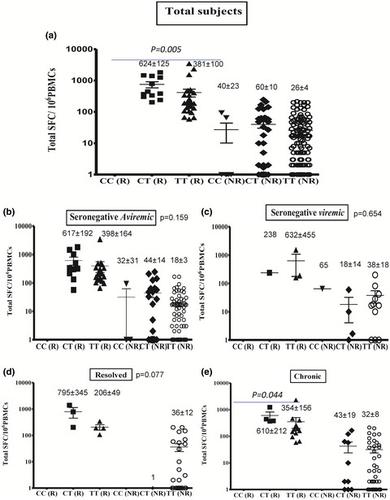当前位置:
X-MOL 学术
›
Clin. Exp. Immunol.
›
论文详情
Our official English website, www.x-mol.net, welcomes your
feedback! (Note: you will need to create a separate account there.)
Association of the Polymorphism of the Toll-like Receptor (TLR) 3 and TLR9 Genes with Hepatitis C Virus-Specific Cell-Mediated Immunity Outcomes Among Egyptian Healthcare Workers.
Clinical & Experimental Immunology ( IF 3.4 ) Pub Date : 2020-09-16 , DOI: 10.1111/cei.13514 S F Abdelwahab 1, 2, 3 , S Hamdy 1, 4 , A M Osman 4 , Z A Zakaria 1, 5 , I Galal 1 , M Sobhy 1 , M Hashem 1, 6 , W R Allam 1, 7 , M Abdel-Samiee 8 , E Rewisha 8 , I Waked 8
Clinical & Experimental Immunology ( IF 3.4 ) Pub Date : 2020-09-16 , DOI: 10.1111/cei.13514 S F Abdelwahab 1, 2, 3 , S Hamdy 1, 4 , A M Osman 4 , Z A Zakaria 1, 5 , I Galal 1 , M Sobhy 1 , M Hashem 1, 6 , W R Allam 1, 7 , M Abdel-Samiee 8 , E Rewisha 8 , I Waked 8
Affiliation

|
Variations in the immune response could explain resistance to hepatitis C virus (HCV) infection. Toll‐like receptor gene (TLR)‐3 is an innate detector of dsRNA viruses, and the TLR‐9 gene recognizes bacterial and viral unmethylated cytosine–phosphate–guanosine (CpG) motifs. We previously reported that the TLR‐3.rs3775290 CC genotype was associated with HCV chronicity and that the TLR‐9 gene played no major role in this infection. This study identified the role of TLR‐3.rs3775290 (c.1377C/T), TLR‐9.rs5743836 (−1237T→C) and TLR‐9.rs352140 (G2848A) gene polymorphisms in predicting the outcome of HCV‐specific cell‐mediated immunity (CMI) among Egyptian health‐care workers (HCWs). We enrolled 265 HCWs in this study and divided them into four groups. Group 1: 140 seronegative‐aviraemic HCWs; group 2: 20 seronegative‐viraemic HCWs; group 3: 35 subjects with spontaneously resolved HCV infection; and group 4: 70 chronic HCV HCWs (patients). All subjects were genotyped by polymerase chain reaction–restriction fragment length polymorphism (PCR‐RFLP) analysis for the TLR‐3.rs3775290, TLR‐9.rs5743836 and TLR‐9.rs352140 single nucleotide polymorphisms (SNPs). We also quantified HCV‐specific CMI in the four groups using an interferon (IFN)‐γ enzyme‐linked immunospot (ELISPOT) assay in response to nine HCV genotype 4a, overlapping 15mer peptide pools covering the whole viral genome. No statistically significant difference was found between CMI‐responding subjects with different HCV states and TLR‐3.rs3775290 or TLR‐9.rs352140 genotypes. However, there was a significant relationship between the outcome of the HCV‐specific CMI and the TLR‐9.rs5743836 genotype among the responding subjects (P = 0·005) and the chronic HCV patients (P = 0·044). In conclusion, TLR‐9.rs5743836 SNP, but not TLR‐3.rs3775290 or TLR‐9.rs352140 genotypes, could predict the outcome of HCV‐specific CMI responses among Egyptians infected with genotype‐4.
中文翻译:

Toll 样受体 (TLR) 3 和 TLR9 基因的多态性与埃及医护人员的丙型肝炎病毒特异性细胞介导的免疫结果的关联。
免疫反应的变化可以解释对丙型肝炎病毒 (HCV) 感染的抵抗力。Toll 样受体基因 (TLR)-3 是 dsRNA 病毒的先天检测器,TLR-9 基因可识别细菌和病毒的未甲基化胞嘧啶-磷酸-鸟苷 (CpG) 基序。我们之前报道过 TLR-3.rs3775290 CC 基因型与 HCV 慢性化有关,并且 TLR-9 基因在这种感染中没有发挥主要作用。本研究确定了 TLR-3.rs3775290 (c.1377C/T)、TLR-9.rs5743836 (-1237T→C) 和 TLR-9.rs352140 (G2848A) 基因多态性在预测 HCV 特异性细胞结果中的作用埃及卫生保健工作者 (HCW) 的介导免疫 (CMI)。我们在这项研究中招募了 265 名医护人员,并将他们分为四组。第 1 组:140 名血清阴性的病毒血症医护人员;第 2 组:20 名血清阴性病毒血症医护人员;第 3 组:35 名 HCV 感染自然消退的受试者;第 4 组:70 名慢性 HCV HCW(患者)。所有受试者均通过聚合酶链反应限制性片段长度多态性 (PCR-RFLP) 分析对 TLR-3.rs3775290、TLR-9.rs5743836 和 TLR-9.rs352140 单核苷酸多态性 (SNP) 进行基因分型。我们还使用干扰素 (IFN)-γ 酶联免疫斑点 (ELISPOT) 检测对 9 种 HCV 基因型 4a 做出反应,对覆盖整个病毒基因组的 15mer 肽库重叠,量化了四组中 HCV 特异性 CMI。在具有不同 HCV 状态和 TLR-3.rs3775290 或 TLR-9.rs352140 基因型的 CMI 反应受试者之间没有发现统计学上的显着差异。然而,HCV 特异性 CMI 的结果与应答受试者的 TLR-9.rs5743836 基因型之间存在显着相关性(P = 0·005) 和慢性 HCV 患者 ( P = 0·044)。总之,TLR-9.rs5743836 SNP,而不是 TLR-3.rs3775290 或 TLR-9.rs352140 基因型,可以预测感染基因型 4 的埃及人的 HCV 特异性 CMI 反应的结果。
更新日期:2020-09-16
中文翻译:

Toll 样受体 (TLR) 3 和 TLR9 基因的多态性与埃及医护人员的丙型肝炎病毒特异性细胞介导的免疫结果的关联。
免疫反应的变化可以解释对丙型肝炎病毒 (HCV) 感染的抵抗力。Toll 样受体基因 (TLR)-3 是 dsRNA 病毒的先天检测器,TLR-9 基因可识别细菌和病毒的未甲基化胞嘧啶-磷酸-鸟苷 (CpG) 基序。我们之前报道过 TLR-3.rs3775290 CC 基因型与 HCV 慢性化有关,并且 TLR-9 基因在这种感染中没有发挥主要作用。本研究确定了 TLR-3.rs3775290 (c.1377C/T)、TLR-9.rs5743836 (-1237T→C) 和 TLR-9.rs352140 (G2848A) 基因多态性在预测 HCV 特异性细胞结果中的作用埃及卫生保健工作者 (HCW) 的介导免疫 (CMI)。我们在这项研究中招募了 265 名医护人员,并将他们分为四组。第 1 组:140 名血清阴性的病毒血症医护人员;第 2 组:20 名血清阴性病毒血症医护人员;第 3 组:35 名 HCV 感染自然消退的受试者;第 4 组:70 名慢性 HCV HCW(患者)。所有受试者均通过聚合酶链反应限制性片段长度多态性 (PCR-RFLP) 分析对 TLR-3.rs3775290、TLR-9.rs5743836 和 TLR-9.rs352140 单核苷酸多态性 (SNP) 进行基因分型。我们还使用干扰素 (IFN)-γ 酶联免疫斑点 (ELISPOT) 检测对 9 种 HCV 基因型 4a 做出反应,对覆盖整个病毒基因组的 15mer 肽库重叠,量化了四组中 HCV 特异性 CMI。在具有不同 HCV 状态和 TLR-3.rs3775290 或 TLR-9.rs352140 基因型的 CMI 反应受试者之间没有发现统计学上的显着差异。然而,HCV 特异性 CMI 的结果与应答受试者的 TLR-9.rs5743836 基因型之间存在显着相关性(P = 0·005) 和慢性 HCV 患者 ( P = 0·044)。总之,TLR-9.rs5743836 SNP,而不是 TLR-3.rs3775290 或 TLR-9.rs352140 基因型,可以预测感染基因型 4 的埃及人的 HCV 特异性 CMI 反应的结果。











































 京公网安备 11010802027423号
京公网安备 11010802027423号